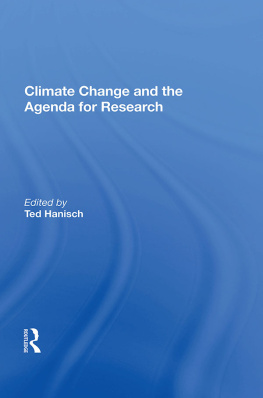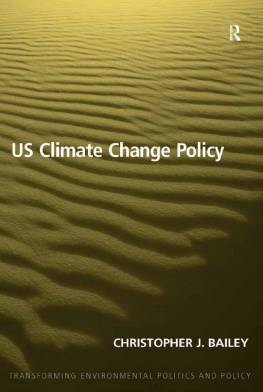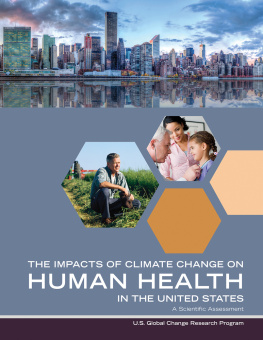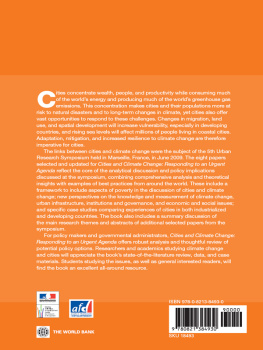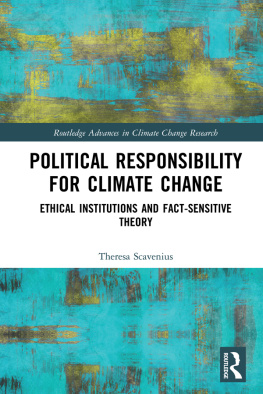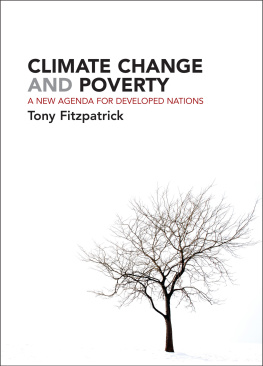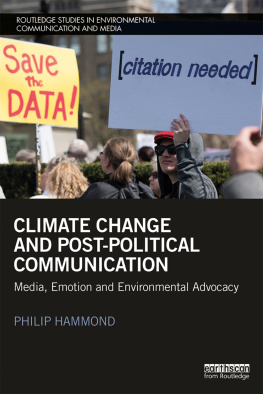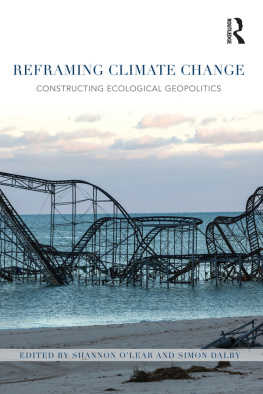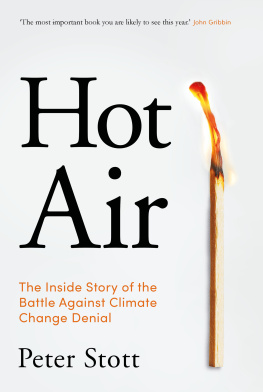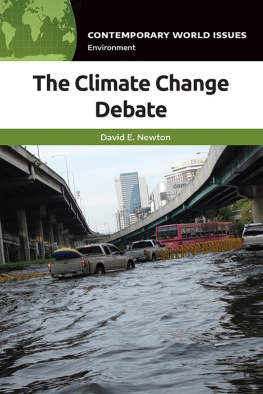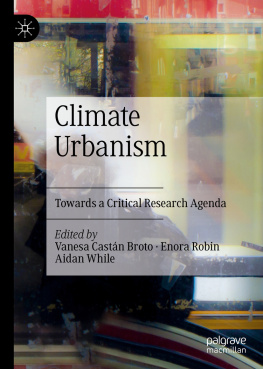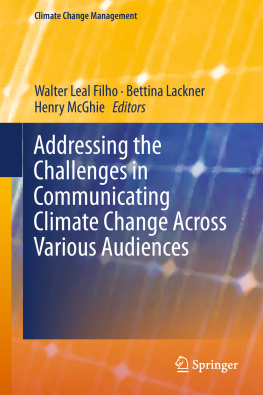Climate Change and the Agenda for Research
First published 1994 by Westview Press
Published 2018 by Routledge
52 Vanderbilt Avenue, New York, NY 10017
2 Park Square, Milton Park, Abingdon, Oxon OX14 4RN
Routledge is an imprint of the Taylor & Francis Group, an informa business
Copyright 1994 by Taylor & Francis
All rights reserved. No part of this book may be reprinted or reproduced or utilised in any form or by any electronic, mechanical, or other means, now known or hereafter invented, including photocopying and recording, or in any information storage or retrieval system, without permission in writing fromthe publishers.
Notice:
Product or corporate names may be trademarks or registered trademarks, and are used only for identification and explanation without intent to infringe.
Library of Congress Cataloging-in-Publication Data
Climate change and the agenda for research / edited by Ted Hanisch.
p. cm.
Includes bibliographical references.
ISBN 0-8133-8791-4
1. Climactic changesEnvironmental aspects. 2. Environmental
policyDeveloping countries. 3. Greenhouse gasesEnvironmental
aspects. 4. United Nations Conference on Environment and
Development (1992: Rio de Janeiro, Brazil) I. Hanisch, Ted, 1947
QC981.8.C5C513 1994
274. 7.082dc20
94-13943
CIP
ISBN 13: 978-0-367-01194-9 (hbk)
Contents
Ted Hanisch
Calestous Jurrn and Edith Mneney
Jane A. Leggett
Eunice Rtbeiro Durham
Rajendra K. Pachauri
William R. Cline
Arild Underdal
Rudolf Dolzer
Michael Hoel and Ivar S. A. Isaksen
Ted Hattisch
T. M. L. Wigley
T. M. L. Wigley
Guide
The Center for International Climate and Energy Research-Oslo (CICERO) is a policy research foundation of the University of Oslo, Norways largest university. Founded by the Norwegian government in 1990, CICERO forms part of a world-wide research effort in support of climate and energy related multi-lateral cooperation.
Ted Hanisch held the position of Director of the Center for International Climate and Energy Research-Oslo (CICERO) until 1993. He is now Deputy Director of the Norwegian Employment Directorate.
Dr. William R. Cline is a Senior Fellow at the Institute for International Economics in Washington, D.C.
Dr. Rudolf Dolzer is a Professor on the Law Faculty of the University of Mannheim, Lehrstuhl fr Vlkerrecht, in Mannheim, Germany.
Dr. Eunice Ribeiro Durham is a Professor at NUPES - University of Sao Paulo in Brazil.
Dr. Michael Hoel is a Professor of Economics at the University of Oslo.
Dr. Ivar S. A. Isaksen is a Professor of Geophysics at the University of Oslo and Senior Scientist at CICERO.
Dr. Calestous Juma is the Executive Director of the African Center for Technology Studies (ACTS) in Nairobi, Kenya.
Dr. Jane A. Leggett is chief of the Stabilization Branch in the Climate Change Division of the Environmental Protection Agency in Washington, D.C.
Edith Mneney is a Research Associate at Kenyas African Center for Technology Studies (ACTS) Ecotechnology Institute.
Dr. Rajendra K. Pachauri is Director, Tata Energy Research Institute, New Delhi.
Dr. Arild Underdal is currently Prorector of the University of Oslo. He is also a Professor of Political Science at the University of Oslo and Senior Scientist at CICERO.
Dr. T. M. L. Wigley is Director of the Office for Interdisciplinary Earth Studies of the University Corporation for Atmospheric Research, Boulder, Colorado.
Introduction
Ted Hanisch
From the early days of the Brundtland Commission until the Rio Summit, policy makers and scientists have struggled with alternative global regimes to prevent dangerous changes in the atmosphere and elements of it. The discussion continued while the UN Intergovernmental Panel on Climate Change (IPCC), from 1989 to 1990, managed to sort out much of the discord in the sciences about climate change itself.
When we at CICERO considered the state of the situation here in Oslo after Rio in late June 1992, we insisted on starting our further work on climate change on the new platform created by the summit. We decided to invite a group of eminent, leading experts to assess the platform created by the UN Framework Convention on Climate Change (FCCC). We wanted to hurry forward on this basis, partly because we had tried to assist negotiators in their efforts with some success, and partly because we simply felt that too much literature had been speculating rather freely about possible climate regimes.
The global effort to prevent dangerous climate change is now well into its first phase of institution building. The platform was created by the UN Convention on Climate Change, signed in Rio de Janeiro in June 1992. Any UN convention of this sort is a framework for building new global institutions.
When negotiations concluded in New York in May 1992, the Climate Convention was criticized as non-binding and empty. As months passed, more experts tended to acknowledge that the Convention initiated a large political process which would last for a couple of decades. Patience is a necessity for all those who spend their time and intellect on global environmental problems.
The convention also unveiled real challenges to the academic community throughout the world. Many leading scientists have for years argued for action to limit emissions and preserve sinks and reservoirs of greenhouse gases. When their best assessment was summarized by the UN Intergovernmental Panel on Climate Change (IPCC) in 1990 the political establishment generally accepted the challenge. But, as before, this raised more questions for the academic community, some of which were answered by 1993, and some which were not. This is true for the science of climate change as such, as well as for the scientific analysis of relevance to regulation and response strategies, i.e. the legal, institutional and economic aspects of the problem.
The CICERO seminar in 1992 focused on the agenda for research given the platform established by the Climate Convention. Until then, the academic community to a large extent had discussed its priorities in light of possible climate regimes. Since we at CICERO had been actively involved in advising negotiators in the Intergovernmental Negotiating Committee, we were early to recognize the trailbreaking function of the convention.
We knew from studies made by our staff on global and regional environmental negotiations that the building of institutions has an organizational as well as a scientific side. When we look at the structure expected when the convention will enter into force probably by mid-1995, we see that much is needed before we have an institution capable of managing the regulatory process. Greenhouse gas emissions have an enormous number of sources, many of which can only be changed by measures of major economic significance. Conflicts of interest are likely to occur within nations and among nations, notably as targets grow firmer and higher.
From a scientific point of view there is a strong need to improve our understanding and empirical knowledge of the causes of climate change. There seems to be agreement among scientists that our best knowledge is sufficient for governments to decide on the first generation of measures. So-called no regrets options should be seen as a low insurance premium, given the dramatic and irreversible changes that may take place.

